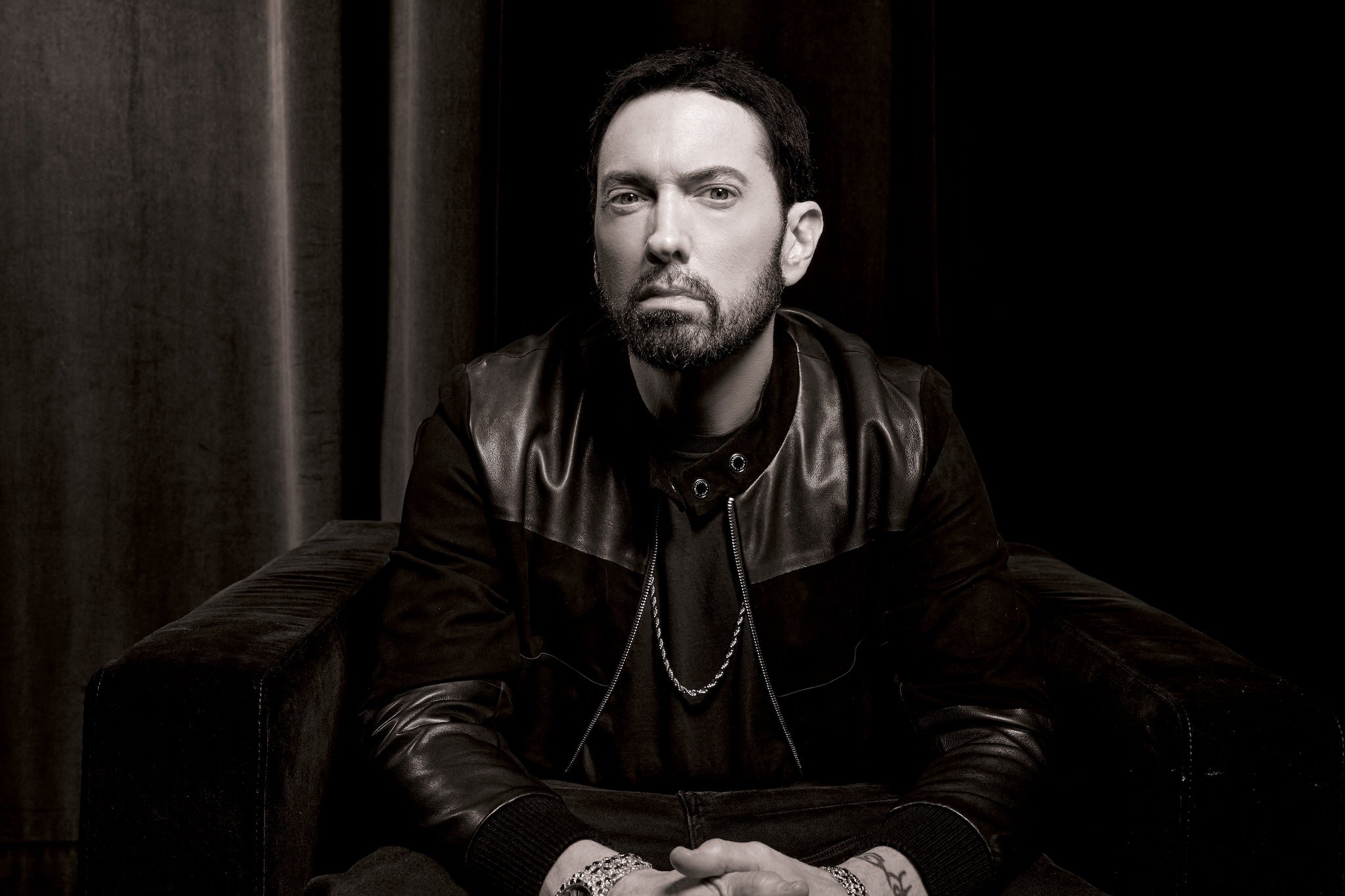In the past decade or so, critics have suggested Eminem has been outpaced by new young rap talent. But the only emcee Marshall Mathers has really been competing against is his younger self. The Slim Shady alter-ego behind his 1999 breakthrough LP and the many hits that followed – most notably the brattish, bombastic “I’m Back” – was Mathers’ id, minus the ego. A malevolent clown persona through which the Detroit rapper felt free to indulge every forbidden thought that crossed his transom, every misogynistic fantasy, homophobic zinger, and drug-addled boast. The sort of thing, we’re told, you couldn’t get away with today. Though not for lack of him trying.
Across a series of sober latter-day albums with titles such as Recovery (2009) and Revival (2017), Mathers evolved, somewhat, attempting to make peace with a childhood of abuse and neglect. To a degree, Shady followed suit – Mathers’ manager, Paul Rosenberg, told XXL a few years back that “Shady thinks a little more now, as a character”. But the horror-movie plotline of his 12th album neatly sidesteps any of this ideological progress by seeing Shady return via time-portal from 2002, anti-hero turned super-villain. In the video for lead single “Houdini”, a panicky Mathers – in superhero garb, resembling Del Boy in that Only Fools and Horses episode with the inflatable sex dolls – tells producer Dr Dre: “He’s trying to get us cancelled!”

Marshall Mathers clashes with his problematic alter-ego on his 12th studio album (Supplied by label)
It sets the tone for an album that often feels like a bet to see how many Caitlyn Jenner jabs Mathers can cram into 65 minutes. The “Houdini” clip ends on a cataclysmic event yielding “some unholy hybrid” of the young, insolent Shady and Mathers’ older, paunchier self (he’s now 51). But if this album was conceived to let Mathers have his cake and eat it – to indulge his earlier, purposefully offensive wordplay under the guise of struggling against the Shady persona within – the reality is the worst of both worlds.
Much of The Death Of Slim Shady resembles a Telegraph op-ed: the ham-fisted mashing of people’s buttons, the blethering about “the PC police” and “Gen Z” coming to get him. Anything, it seems, to get a reaction. On “Habits”, Mathers spits that his critics are “mad because they can’t tame me” – but there’s nothing edgy about these creaky routines. Like many who harp on about a “woke mind-virus”, Mathers is the one who sounds like he has brainworms, forever bleating about pronouns and, on “Road Rage”, offering the entirely unsolicited information that his “dick just won’t expand” around trans people. OK, mate.
His lyrical obsessions are bizarre: several tracks make fun of Christopher Reeve, the Superman actor left paralysed in a horse-riding accident, who died in 2004, a full two decades ago. In moments like this, The Death Of Slim Shady feels like an LP-length Weird Al parody of Eminem, only even Weird Al wouldn’t stoop so low to a beat so uninspired as that on “Houdini”, which simply loops the riff to the Steve Miller Band’s “Abracadabra” ad infinitum, sounding like the ringtone on an unanswered cell phone.
“Houdini” certainly marks a nadir for the album, though few of the other beats rise above unremarkable. “Tobey” – another single, its title referencing Maguire, star of Spider-Man – is the standout: its production taut with tension, though it’s notable Mathers doesn’t pick up the mic until over three minutes in, following sterling verses from the youthful BabyTron and regular foil Big Sean. Mathers’ rapping maintains his signature sharpness of diction throughout; it’s the content that’s at fault: punching relentlessly downwards, so joylessly, so without inspiration.
Three-quarters in, the struggle between Mathers’ two selves ends in murder/suicide, before he wakes and utters those words adored by every dullard screenwriter: “It was all a dream.” The last few tracks strike an abrupt change in tone. “Temporary”, a song recorded for his daughter Hailie, who has long served as muse in Mathers’ more tender moments, features a hook by regular collaborator Skylar Grey. Its gloomy, somewhat mawkish thread is picked up by the closing “Somebody Save Me”, on which Mathers imagines a world in which he’d never overcome his addiction and died before seeing his other daughter, Alaina, graduate – or record her first podcast (every father’s nightmare).
This grim climax picks up a theme hinted at earlier on “Habits”. Here, Mathers likens this return to his Shady persona to a drug relapse. The connection between his addiction, his fame and his Shady self is again referenced in the skit “All You Got”: “You were nothin’ till you found me,” Shady tells Mathers. “You can’t outgrow me/ You can’t outthink me.” The Freudian theme is intriguing; a better album would have fleshed it out, dug deeper. But that would have come at the expense of a couple of Caitlyn Jenner jokes, and he couldn’t have that, could he?




